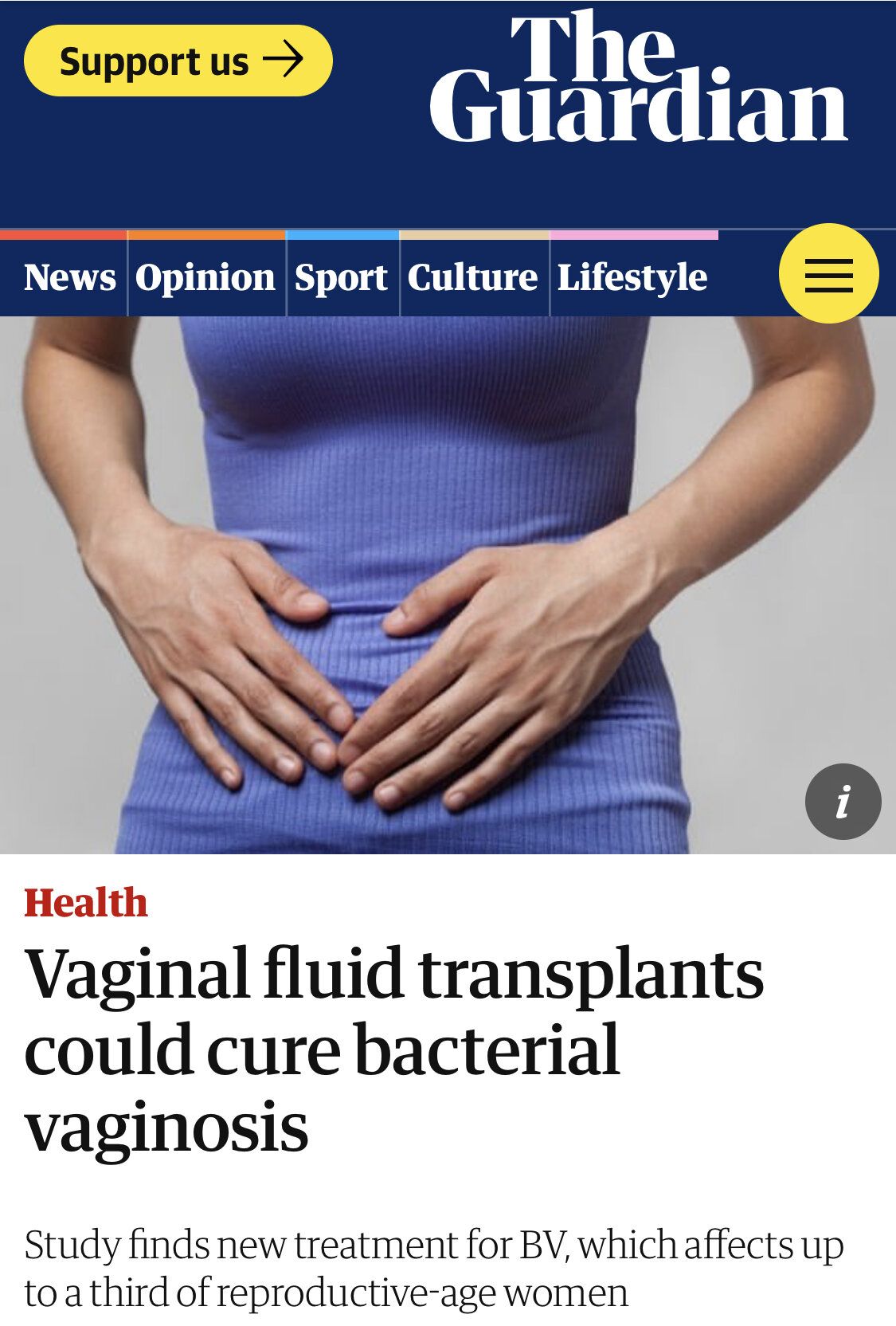Image: @Paulfuetes_design
When I was at medical school I always wanted to be a Transplant Surgeon. Never in my wildest dreams did I think that in years to come I would be writing a blog post on vaginas, and certainly not on vaginal microbiome transplants! Read on if you want to know more….
It all started with BV…
Bacterial vaginosis (aka BV) is a common infection that is characterised by an alteration of the normal vaginal bacteria or microbiome (click here for a link to a previous post that I wrote about the vaginal microbiome). There is a loss of Lactobacillus bacterial species which normally live in the vagina, and an overgrowth of anaerobic species such as Gardnerella, Atopobium, Prevotella, Sneathia etc. It usually causes excessive discharge which can be quite foul-smelling, irritating but can also be asymptomatic. It’s not a sexually transmitted infection, but people often report getting it after sex, which may be because semen has a more alkaline pH compared to the vagina, however you can still get it even if you use condoms, so we don’t truly understand why. It has however been associated with a higher risk of getting sexually transmitted infections, such as chlamydia and HIV, and with HPV & cervical cancer and pregnancy-related complications including miscarriage and preterm labour.
How is BV treated?
BV is usually treated with antibiotics (typically Metronidazole or Clindamycin), however the treatment is often ineffective with high rates of recurrent bouts. This means it’s difficult to treat and can have a serious impact on quality of life as a result. Numerous studies have explored the use of oral probiotics (bacteria that are consumed for health benefits) to treat BV, the principle being that you replace the missing Lactobacillus bacteria that they stop the bad bacteria growing and might also be able to breakdown the biofilms (kind of like plaque in your teeth) that allow the bad bacteria to form a strong hold and cause recurrent episodes. Whilst there have been quite promising results, a lot of studies still report high recurrence rates. This might be because they weren't quite the right type of probiotics, or because the patients weren't treated for long enough, the bacterial just didn’t survive long-term...lots of potential reasons. A team in Israel decided to take things one step further, and perform a vaginal microbiome transplant.
A vaginal microbiome transplant?
Yes you’re reading that right… This involved collecting vaginal secretions from a healthy women (they performed lab tests to check she had the right kind of bacteria in her vagina first, and also screened for infections) and the put it into the vagina of a woman with BV. Their results were published this week in Nature Medicine (vvv respected journal if you're a major geek like me) with pretty interesting results. They included 5 women with intractable bacterial vaginosis, and 4 of them were successfully treated and hadn’t had any further BV episodes after a minimum of 5 months. HOW INTERESTING!!! It’s an idea that has already been used successfully in people with bowel infections…except you transplant poo instead of vaginal secretions, and it’s called a faecal microbiome transplant. The principle really is that you put the good bacteria along with all the other molecular components of their environment. So it's kind of like moving into a new house where someone's already stocked your fridge and sorted your electricity and WiFi supply...the concept being you'll live in harmony straight away.
Sounds pretty extreme right?
Yes, I do kind of agree. But it’s an exciting proof of principle study for a disease that is notoriously difficult to treat. The authors of the study do acknowledge a few potential limitations – we don’t really know if we can truly screen patients for ALL infections. So ,there is a potential risk of getting infections, just like there is with blood transfusions for example. And they state that they can’t be sure that sperm would not be transferred if someone had sex without barrier contraception. There could therefore be a theoretical risk of pregnancy. Although they asked all ‘donors’ to abstain from sex for one week prior to donating their vaginal sample.
So I wouldn’t be going wild just yet. But that’s because I’m not a tabloid newspaper.
This is just a proof of principle study with only 5 women. FIVE!!! We need HUGE studies looking in way more depth at if it actually works in a larger group of women, and if so how well, what factors affect success, and of course into safety! I’m also very intrigued to know how acceptable this concept would be to women with BV.
Will I be doing vaginal microbiome transplants in the future?
Who knows? But bearing in mind everyone laughed at me a few years ago when I said ‘the vaginal microbiome is going to be the newest sexy area of vagina research’ And look where we are now.
Never say never…

